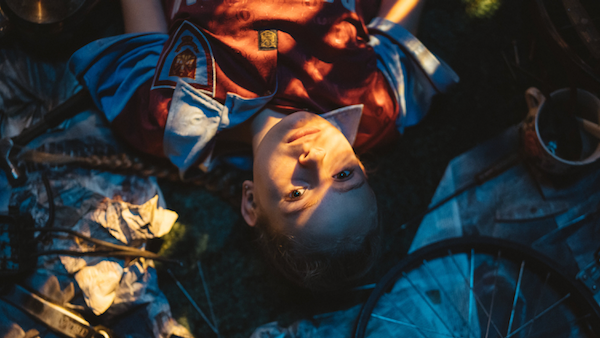Movie review by Greg Carlson
In Sundance Grand Jury Prize winner “Scrapper,” her feature debut as writer and director, Charlotte Regan establishes a much more whimsical tone than the darker notes sounded by Charlotte Wells in her masterful “Aftersun.” There are more than enough stories exploring difficult father-daughter relationships to chalk up the similarities between the two movies as a fluke of timing, but Regan’s film faces the unenviable challenge of premiering in the wake of so many critical accolades deservingly showered on Wells’s own cinematic arrival. Regan’s entertaining film won’t land at the top of as many year-end “best of” lists as its predecessor, but it is worth seeking out.
Regan introduces the viewer to protagonist Georgie (Lola Campbell), a resourceful 12-year-old devoted to avoiding placement within the foster care system following the death of her mother. Georgie, like the plucky hero of a classic young adult novel, stays one step ahead of the authorities, enlisting the aid of voice recordings from a convenience store employee to fool any social worker who attempts to confirm her welfare. Without any responsible grownup in sight, Georgie turns to petty crime with pal Ali (Alin Uzun) to make ends meet until the surprise arrival of her previously absent father Jason (Harris Dickinson).
Like Paul Mescal and Frankie Corio, the sparking (and sparkling) chemistry between Campbell and Dickinson propels the action and engages the viewer. Regan draws from the tradition of wise-beyond-their-years kids reversing roles with adults who could use some parenting of their own. Sheila O’Malley, who wrote a terrific 2019 piece on the golden age of “tomboy movies” for “Film Comment,” picked up on the “Paper Moon” vibes in her “Scrapper” review for the Roger Ebert site. Just as we are given permission to cheer the generational con artists in Bogdanovich’s movie, Regan sympathizes with a dad who passes down his bicycle-theft knowledge to his offspring.
Dickinson, who has been so great in projects like “Beach Rats” and “Triangle of Sadness,” nails the contradictions of Jason’s arrested development. Longing for connection and a sense of greater responsibility, the performance illustrates how much childhood remains inside someone who became a parent while still a kid himself. Paired with Campbell, a newcomer who more than holds her own with the screen veteran, Dickinson finds all kinds of places only hinted at in the script. Georgie’s grief at the loss of her closest companion and caregiver may be more outwardly apparent, but Jason also earns our empathy.
Paul Klein identifies similarities and differences between “Aftersun” and “Scrapper,” but argues that both are important films for the simple fact that their portrayals of “people from broken homes and lower incomes” avoid demonizing many choices that might be seen as symptoms of class struggle. Klein goes on to commend Regan’s decision to emphasize Georgie’s use of fantasy and imagination rather than to focus on poverty and suffering. Multiple reviews have overstated the various ways in which “Scrapper” evokes the cinema of Wes Anderson, but there is no question that Regan’s Georgie-level worldview carefully stylizes what would otherwise be grim reality.
